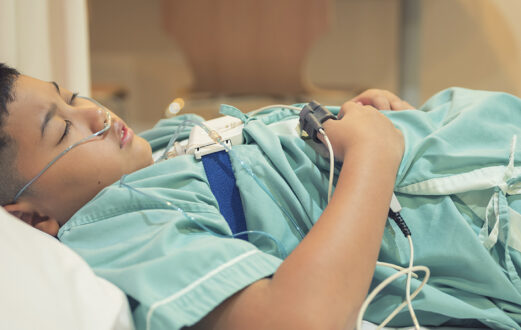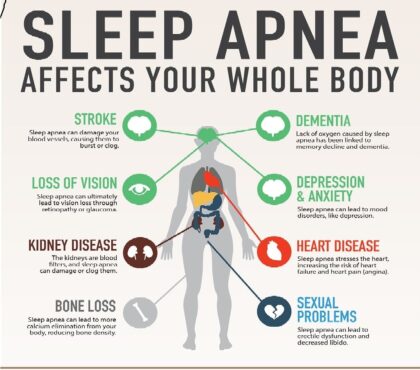
Symptoms of Sleep Apnea: Signs You Need a Sleep Study

It’s not always best to be the loudest person in the room, especially at night. If your partner is constantly poking you in the ribs, or you wake up feeling tired, it may be time to address your sleeping (or lack there-of).
Sleep apnea is a condition that affects millions of Americans, but often goes undiagnosed or is chalked up to bad sleeping habits. However, sleep apnea is not something to take lightly, and the effects of sleepless nights can be felt long after waking up.
Learn about the signs and symptoms of sleep apnea, along with the risk factors associated, and work with your primary care doctor to understand if a sleep study is right for you.
Two Types of Sleep Apnea
Sleep apnea is a disorder that occurs when your breathing stops during sleep. Those with sleep apnea will often complain of not sleeping well, waking up tired, or being told they snore loudly.
There are two types of sleep apnea:
Central: This type occurs when your brain fails to inform your breathing muscles to function. Central sleep apnea is often caused by another disease (such as Lou Gehrigs) or a previous stroke or heart attack that has impacted the respiratory control center.
- Obstructive: This type occurs when your airway becomes blocked as you sleep due to a collapse in the soft tissue of your throat. This affects the flow of oxygen through your body which can impact your heart and brain functions. Obstructive sleep apnea is the most common type of sleep apnea.
Sleep apnea often occurs in adults who are overweight, those of an older age, or have a history of smoking or other respiratory issues.
Common Signs Associated With Sleep Apnea
While snoring is the issue we most commonly think of in regards to sleep apnea, there are other signs that may point to this sleeping disorder:
Snoring as well as gasping or choking while sleeping
Tiredness through the day
Dry mouth or sore throat
Waking up suddenly through the night
Brain fog and headaches
Frequent need to urinate
Night sweats
Sexual dysfunction
Snoring alone may not indicate that you have the disorder. However, if you have two or more of these symptoms, it may indicate a need to address your sleeping issues.

Why Get Sleep Apnea Treated?
Left untreated, sleep apnea can lead to a number of health issues which can impact more than just your sleep.
Sleep apnea can cause:
Heart issues
High blood pressure
Daytime fatigue
Type 2 diabetes
Addressing sleep apnea before it causes an issue is key. For some, treating the disorder leads to an almost instantaneous better night of sleep and reduction of their symptoms
How is Sleep Apnea Treated?
It’s important to first diagnose sleep apnea so your doctor can understand what treatment option is going to work best for you. There are other medical conditions that can affect sleep, so determining if it is sleep apnea or another issue is the first step.
In order to diagnose, your doctor will likely recommend a sleep study. At Schneck, we offer two different types of sleep studies, at home and a sleep lab study. Both studies will monitor your sleep and utilize data alongside your symptoms to make a diagnosis.
After diagnosis, there are a few options for treatment of sleep apnea. Your doctor may recommend a continuous positive airway pressure or a CPAP device. This is worn over the mouth and/or nose to supply a steady stream of gas pressure to keep the airway open. This is the most common type of treatment option for sleep apnea.
There are many different types of CPAP devices. Your provider will help you find one that is comfortable for you depending on your sleeping habits. However, there are some alternative options that your doctor may recommend.
Learn more about what a sleep study at Schneck looks like by visiting our sleep center page.
